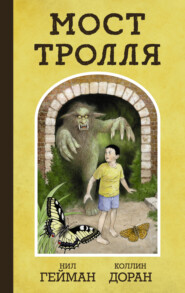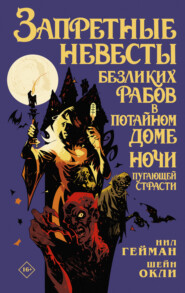По всем вопросам обращайтесь на: info@litportal.ru
(©) 2003-2024.
✖
The Complete Interworld Trilogy: Interworld; The Silver Dream; Eternity’s Wheel
Настройки чтения
Размер шрифта
Высота строк
Поля
I walked down Maple Road, trying to catch my breath, rubbing my numb right hand with my left, trying to get a handle on what had just happened.
My house wasn’t my house any longer. The people who lived there weren’t my family. There were bad guys on flying manhole covers after me, and a guy with an armored crotch and a mirrored face.
What could I do? Go to the police? Suuure, I told myself. They hear stories like this one all the time. They send the people who tell them stories like that to the funny farm.
That left one person I could talk to. I came around the curve in the street and saw Greenville High in front of me.
I was going to talk to Mr. Dimas.
(#ulink_712a11be-fe5e-5364-9e3a-c14459ee87e5)
GREENVILLE HIGH SCHOOL WAS built nearly fifty years ago. The city closed it when I was a kid for a few months to remove the asbestos. There are a couple of temporary trailers out in the back that house the art rooms and the science labs, and will do until they get around to building the new extension. It’s kind of crumbling; it smells like damp and pizza and sweaty sports equipment—and if I don’t sound like I love my school, well, I guess that’s because I don’t. But I had to admit it made me feel pretty good to be there now.
I made it up the steps, keeping a wary eye on the sky for gladiators on flying disks. Nothing.
I walked inside. Nobody gave me a second glance.
It was the middle of fifth period, and there weren’t too many people in the halls. I headed for Dimas’s classroom as fast as I could without running. He’d never been my favorite teacher—those bizarre tests he came up with were hard—but he’d always impressed me as someone who wouldn’t lose his head in an emergency.
If this wasn’t an emergency, I didn’t know what was. And it was his fault, in a way, wasn’t it?
I didn’t quite run down the corridor until I got to his classroom. I looked through the glass of the door. He was sitting at his desk, marking a stack of homework papers. I knocked on the door. He didn’t look up, just said “Come!” and kept on marking.
I opened the door and went over to his desk. He kept his eyes on the papers.
“Mr. Dimas?” I tried to keep my voice from shaking. “Do you have a moment?”
He looked up, looked into my eyes, and he dropped his pen. Just dropped it, like that. I bent down, picked it up and put it back on his desk.
I said, “Is there something wrong?”
He looked pale and—it took me a few moments to recognize this—actually frightened. His jaw dropped. He shook his head in the way my dad always called “shaking out the cobwebs” and looked at me again. He held out his right hand.
Then he said, “Shake my hand.”
“Uh, Mr. Dimas . . . ?” I was suddenly seized by the fear that he was part of all this weirdness, too, and the thought frightened me so that I could barely keep standing. I needed someone to be the adult right now.
He still held his hand out. His fingers were shaking, I noticed. “You look like you’ve seen a ghost,” I told him.
He looked at me sharply. “That’s not funny, Joey. If you are Joey. Shake my hand.”
I put my hand in his. He squeezed it just short of painfully, feeling the flesh and the bones of it, then he let go and looked up at me. “You’re real,” he said. “You aren’t a hallucination. What does this mean? Are you Joey Harker? You certainly look like him.”
“Of course I’m Joey,” I said. I’ll admit it—I was ready to start bawling like a baby. This madness, whatever it was, couldn’t be affecting him as well. Mr. Dimas was always so sane. Well, kind of sane. When Mayor Haenkle described him in his column in the Greenville Courier as “crazy as a snowblower in June” I pretty much knew what he meant.
But I had to tell someone what was going on, and Mr. Dimas still seemed like the best choice.
“Look,” I said carefully, “today has gone . . . really weird. You’re the only person I thought could maybe handle it.”
He was still as pale as a pitcher of milk, but he nodded. Then there was a knock on the door and he said, “Come!” He sounded relieved.
It was Ted Russell. He hardly even glanced at me. “Mr. Dimas,” he said. “I got a problem. If I get an F in Social Studies it means I don’t get a car. And I figure you’re going to give me an F.”
Apparently some things even alternate realities couldn’t change; Ted was obviously still grade challenged. Mr. Dimas had looked disappointed when Ted came in; now he was annoyed. “And why exactly is this my problem, Edward?”
That was the Mr. Dimas I remembered. I felt relieved, and before I could think the better of it, I had already spoken. “He’s right, Ted. Anyway, keeping you off the road is a public service. You’re a five-car pileup waiting to happen.”
He turned on me, and I hoped that he wasn’t going to hit me in front of Mr. Dimas. Ted Russell likes to hit people smaller than him, and that takes in a big chunk of the school population. He raised a hand—then he saw it was me.
He stopped, hand in the air, and said, plain as day, “Mother of God, it’s a judgment on me,” and started to cry. Then he ran out of the room. He ran like I had run earlier. It’s called running for your life, I thought.
I looked at Mr. Dimas. He looked back, then hooked one foot around a nearby chair leg and dragged the chair toward me. “Sit,” he told me. “Put your head down. Breathe slow.”
I did. Good thing, too, because the world—or at least his office—had gone kind of wobbly. After a minute things steadied, and I raised my head. Mr. Dimas was watching me.
He walked out of the room, returned a few seconds later with a paper cup. “Drink.”
I drank the water. It helped. A little. “I thought I was having a weird day before. Now it’s somewhere out beyond bizarre. Can you explain any of this to me?”
He nodded. “I can explain a little of it, certainly. At least, I can explain Edward’s reaction. And mine. You see, Joey Harker drowned last year in an accident down at Grand River Falls.”
I grabbed my sanity and held on with both hands. “I didn’t drown,” I told him. “I got pretty shaken up, and I had to have four stitches in my leg, and Dad said that would teach me a lesson I’d never forget, and that trying to go over the falls in a barrel was the single stupidest thing I’d ever tried, and I told him I wouldn’t have done it if Ted hadn’t said I was chicken. . . .”
“You drowned,” said Mr. Dimas flatly. “I helped pull your body out of the river. I spoke at your memorial service.”
“Oh . . .” We both were quiet then for a moment, until the quiet got to be too much and I had to say something. So I said, “What did you say?” Well, wouldn’t you have asked the same thing, if you were me?
“Nice things,” he said. “I told them you were a good-hearted kid, and I told them how you got lost all the time in your first semester here. How we’d have to send out search parties to get you safely to Phys. Ed. or the science trailers.”
My cheeks were burning. “Great,” I said with all the sarcasm I could muster. “That’s just how I’d want to be remembered.”
“Joey,” he asked gently, “what are you doing here?”
“Having a weird day—I told you.” And I was going to explain it all to him—and I bet he would have figured out some of it—but before I could say anything else, the room began to go dark. Not dark as in, the sun went behind a cloud dark, or dark as in, hey, that’s a mighty scary thunderstorm dark, or even dark as in, I’ll bet this is what a total eclipse of the sun looks like. This was dark like something you could touch, something solid and tangible and cold.
And there were eyes in the middle of the darkness.
The darkness formed itself into a shape. It was a woman. Her hair was long and black. She had big lips, like it had been fashionable for movie stars to have back when I was a kid; she was small and kind of thin, and her eyes were so green she had to have been wearing contacts, except she wasn’t.
They looked like a cat’s eyes. I don’t mean they were shaped like cat’s eyes. I mean they looked at me the way a cat looks at a bird.
“Joseph Harker,” she said.
“Yes,” I said. Which was probably not the smartest thing I could’ve said, because then she laid a spell on me.
That’s the best way I can explain it. She moved her finger in the air so that it traced a figure—a symbol that looked a little bit Chinese and a little bit Egyptian—that hung glowing in the air after her finger finished moving, and she said something at the same time; and the word she said hung and vibrated and swam through the room; and the whole of it, word and gesture, filled my head; and I knew I had to follow her for all my life, wherever she went. I would follow her or die in the attempt.
The door opened. Two men came in. One was wearing just a rag, like a diaper around his middle. He was bald—in fact, as near as I could tell, he was completely hairless, and that, with the diaper, made him look like a bad dream even without the tattoos. The tats just made it worse: They covered every inch of his skin from hairline to toenails; he was all faded blues and greens and reds and blacks, picture after picture. I couldn’t see what they were, even though he wasn’t more than five feet away.

















